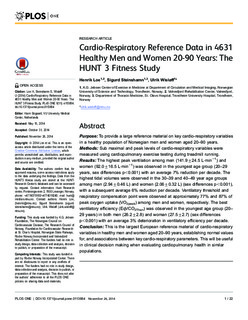Cardio-respiratory reference data in 4631 healthy men and women 20-90 years: The HUNT 3 fitness study
Journal article, Peer reviewed
Permanent lenke
http://hdl.handle.net/11250/2367291Utgivelsesdato
2014Metadata
Vis full innførselSamlinger
Sammendrag
Purpose:
To provide a large reference material on key cardio-respiratory variables in a healthy population of Norwegian men and women aged 20–90 years.
Methods:
Sub maximal and peak levels of cardio-respiratory variables were measured using cardiopulmonary exercise testing during treadmill running.
Results:
The highest peak ventilation among men (141.9±24.5 L·min−1) and women (92.0±16.5 L·min−1) was observed in the youngest age group (20–29 years, sex differences p<0.001) with an average 7% reduction per decade. The highest tidal volumes were observed in the 30–39 and 40–49 year age groups among men (2.94±0.46 L) and women (2.06±0.32 L) (sex differences p<0.001), with a subsequent average 6% reduction per decade. Ventilatory threshold and respiratory compensation point were observed at approximately 77% and 87% of peak oxygen uptake (VO2peak) among men and women, respectively. The best ventilatory efficiency (EqVCO2Than) was observed in the youngest age group (20–29 years) in both men (26.2±2.8) and woman (27.5±2.7) (sex differences p<0.001) with an average 3% deterioration in ventilatory efficiency per decade.
Conclusion:
This is the largest European reference material of cardio-respiratory variables in healthy men and women aged 20–90 years, establishing normal values for, and associations between key cardio-respiratory parameters. This will be useful in clinical decision making when evaluating cardiopulmonary health in similar populations.
